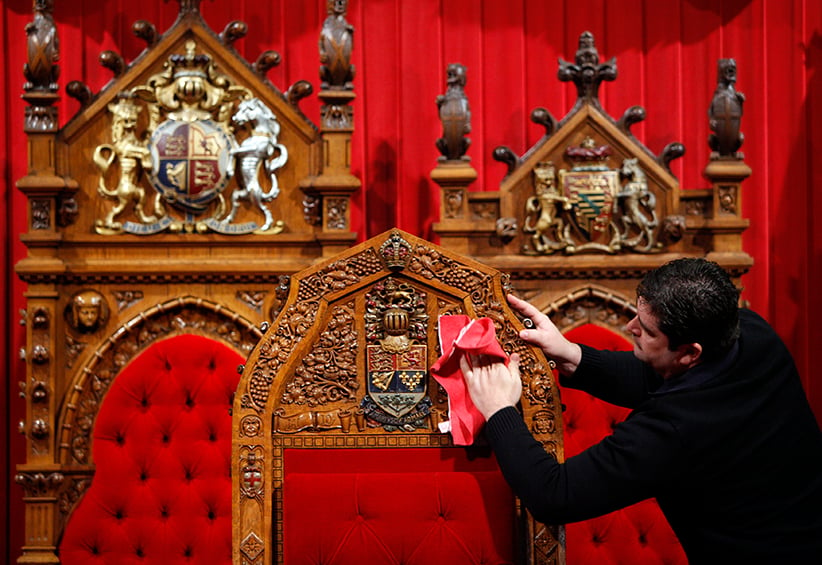What to expect from the Trudeau government’s Throne Speech
Justin Trudeau’s government readies to set its agenda as a very long list
Charles Lamoureux cleans the Senate chamber on Parliament Hill in Ottawa February 25, 2010. Canada’s Prime Minister Stephen Harper will outline his government’s agenda in the Speech from the Throne on March 3. (Blair Gable/Reuters)
Share

This week’s Speech from the Throne might seem like the perfect opportunity for Justin Trudeau to rekindle some of the campaign afterglow that has just begun to fade, inevitably, seven weeks after his Liberals’ election victory. Any new government’s first Throne Speech presents a chance to recast its platform against the backdrop of parliamentary pomp. Yet top Trudeau aides were dampening expectations for soaring rhetoric, as the Liberals prepared to set out their plan for Parliament’s new session.
Instead, when Governor General David Johnston takes his seat in the big chair at the end of the Senate chamber to deliver the speech, insiders say he will be working from a matter-of-fact script: a recapping of well-known Liberal election commitments, with a minimum of fancy verbiage. Keeping it low-key suits the realist mood settling in around Parliament Hill, as MPs prepare for a brief, one-week sitting before leaving again for a prolonged year-end break. After all, Trudeau is already grappling with tough challenges, especially on refugees and climate change, and the latest economic news leaves no doubt he’ll also have to work hard to deliver a feeling that noticeably better times are at hand for Canada’s middle class.
That message must be at the core of even a restrained Throne Speech. The most important Liberal election pledge was “fairness for the middle class,” to be delivered mainly by trimming the federal tax rate on income between $44,700 and $89,401 a year, from the current 22 per cent to 20.5 per cent, while imposing a higher bracket on earnings over $200,000. Those changes will be brought about quickly, government officials said, with a simple motion tabled in the House before it breaks again on Dec. 11. CIBC World Markets Inc. chief economist Avery Shenfeld said the middle-income cut, combined with the Liberal promise of an infrastructure spending boost next year, should add a modest half a percentage point to Canada’s economic growth in 2016.
Still, Shenfeld added that’s only enough, according to his CIBC’s forecast, to lift the country’s GDP growth next year to a “very mediocre” 1.9 per cent. Statistics Canada reported this week that the economy grew a bit through the summer, before shrinking again in September. Exports and household consumption showed some strength, but manufacturing and the battered natural resources sectors remained anemic. To feel truly healthy, Shenfeld said, the economy would have to grow about three per cent next year. “That just doesn’t seem likely, even with the modest degree of stimulus we’re getting from the new government,” he said.
If the Liberals must try to sell their pro-middle-class measures as meaningful against economic headwinds, other platform highlights, which are also bound to be featured in the Throne Speech, look far from easy to implement. Trudeau has already had to modify his pledge to bring 25,000 government-sponsored Syrian refugees to Canada by the end of this year, extending the deadline by two months and adding many privately sponsored refugees to the mix. As well, following his trip this week to the United Nations climate change summit in Paris, he must somehow coax the premiers onside with a national greenhouse gas emissions plan within just three months.
Then there are the sleeper issues, among them his promise to pass a law within 18 months to fundamentally change the way Canadians elect their MPs. Democratic Institutions Minister Maryam Monsef, herself a rookie MP, is charged with setting up a parliamentary committee to consult on electoral reform, including options like ballots on which voters rank their choices, or proportional representation, which would mean the mix of MPs in the House more closely reflects the popular vote. Trudeau has ruled out sticking with the status quo, the so-called first-past-the-post system Canadians are used to. But a poll released this week by the left-leaning Broadbent Institute suggests many Canadians are content with that familiar system.
The poll, conducted by the firm Abacus Data, found that 58 per cent of Canadians think the way we elect MPs needs only minor change or none at all, compared with 42 per cent who favour major change or a complete overhaul. “The results suggest there is a large share of the population that doesn’t have clear views on this and, as a result, probably defaults to the status quo,” said Abacus pollster David Coletto. If electoral reform looks like tough sledding, though, the Liberals might score quicker democratic-renewal points by empowering backbench MPs and setting aside, as promised, one question period a week, British-style, for grilling the Prime Minister.
Even before his first Throne Speech formalizes Trudeau’s agenda, it looks like he will be managing more than enough testing files to keep those new sessions lively.